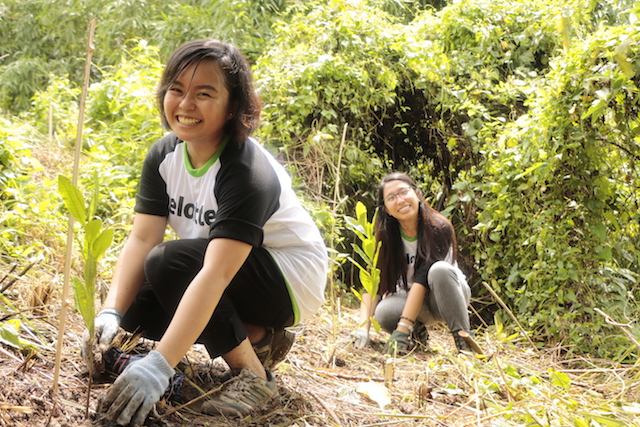Deloitte joins PBSP’s tree-planting initiative
IN OBSERVANCE OF DELOITTE IMPACT DAY

As part of its global volunteerism campaign, Deloitte Philippines once again joined Philippine Business for Social Progress (PBSP) in saving the Upper Marikina River Basin Protected Landscape (UMRBPL), popularly known as Marikina Watershed. Employee-volunteers from Deloitte participated in the firm’s IMPACT Day recently by planting 1,250 trees in the Antipolo City area of the watershed in Rizal. This brings to 3,125 the total number of trees planted by Deloitte in its five-hectare adopted site since last year.
Deloitte member firms all over Southeast Asia designate one day every year as IMPACT Day, a day when employees leave the confines of their offices to engage in activities that reinforce the organization’s collective commitment to local communities. Thousands of Deloitte employees in the region take part by doing various charitable works such as cooking meals in community centers, holding events that help young women reach their potential, and painting rooms in children’s centers.
Here in the Philippines, Deloitte employees braved the steep terrain of the watershed to make a difference for the environment.
According to Greg Navarro, Deloitte Philippines’ Managing Partner & CEO, “CSR is a big part of the Deloitte culture, and we are always looking for ways to expand our capacity and broaden our impact so that we can be of service to more communities. PBSP helps us achieve that. Through this partnership, we are able to pool our resources together with PBSP’s network of volunteer organizations and help more Filipinos.”
PREVENTING ANOTHER ‘ONDOY’
PBSP’s tree-planting initiative at the UMRBPL started as a response to the devastation left by Typhoon Ondoy in 2009 when torrential rains flooded many parts of Metro Manila and nearby areas, claiming lives and property.
The program aims to increase the capacity of the watershed to hold rainwater to help prevent a repeat of the severe flooding in Metro Manila. Leilani Mc Donough, PBSP’s Portfolio Manager for the Environment, said that forests are our first line of defense against rainwater from the mountains, especially now that the Philippines is experiencing extreme weather events such as increased rainfall and ferocious storms.
“If these mountains are deforested, its capacity to absorb water decreases thereby causing surface runoff. This leads to flooding of downstream communities similar to what happened in Metro Manila after Ondoy. By rehabilitating the Marikina Watershed, we can contribute to minimizing or controlling flooding,” Mc Donough said.
Apart from planting various species of indigenous trees such narra, lawaan, and dungon, fruit-bearing trees are also planted to provide a sustainable source of livelihood for nearby communities. PBSP’s Luzon Regional Center Manager Kristine Rivadelo said that treating locals as stakeholders in the project will encourage them to protect the forests, instead of harming them.
She added, “The livelihood component of the project ensures that we can also provide additional income for the households so that we can lessen their dependence on the need to cut trees for their sustenance. This is their community and PBSP will not always be there, thus involving them significantly in the process will ensure the project’s sustainability. Making them involved also trains and capacitates them to think about and mobilize for other projects that can improve their communities. At the end of the day, Deloitte employees did not just plant trees in the Marikina Watershed, they also contributed to PBSP’s mission to empower these communities so that they can achieve better lives for their families.”
Thanks to the support of PBSP member-companies and partners, more than 60,000 trees have already been planted in over 100 hectares of land in the watershed. As the program continues, PBSP is optimistic that the vitality of the Marikina Watershed will be fully restored while giving the people living there a sustainable source of livelihood and developing them to be guardians of the rainforest.
About Philippine Business for Social Progress
Philippine Business for Social Progress is the largest business-led NGO at the forefront of strategic corporate citizenship and business sector leadership contributing to sustainable development and poverty reduction. Established in 1970, PBSP remains a consultant and partner of choice of companies and donors.
PBSP scales up impact by adopting the Collective Impact strategy to solve large, complex, systemic problems. PBSP organizes Platforms for Collective Engagements (PlaCEs) to ensure alignment and sustainability of initiatives by multiple stakeholders.
Responding to the changing landscape of CSR, PBSP’s brand of corporate citizenship taps into the core business competencies of companies and promotes inclusive business as a strategy. PBSP also continues to strategically engage companies through social investment, responsible business practices, and philanthropy.
PBSP creates sustainable solutions to societal problems in its core program areas which are Health, Education, Environment, and Livelihood and Enterprise Development. It also provides off-the-shelf options for engagement of companies and their employees.
With a proven track record, PBSP provides end-to-end services in development consulting which include project and grants management, events and backroom management.


